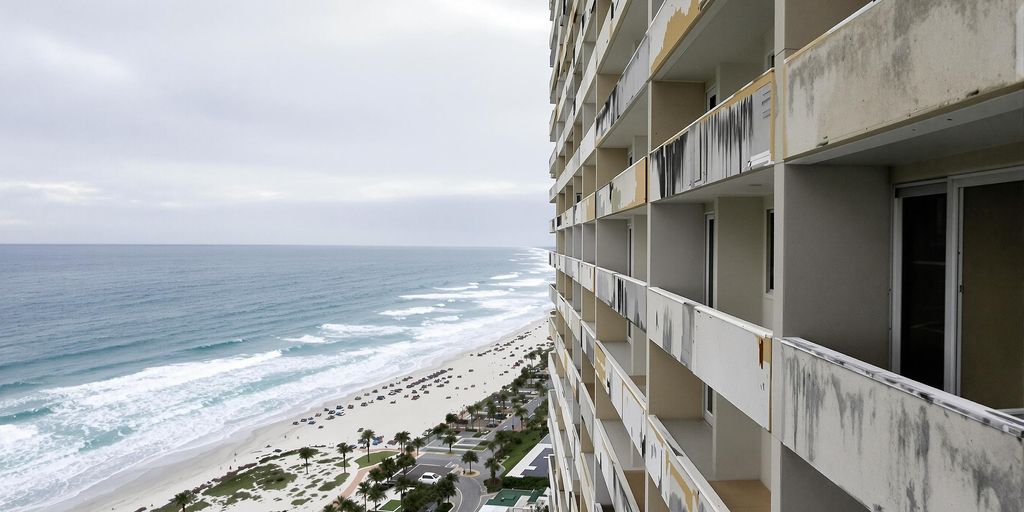Florida’s condominium market is experiencing significant weakness, driven by a glut of inventory, rising costs, and new, stricter safety regulations enacted after the Surfside collapse. These changes, aimed at increasing transparency and ensuring structural integrity, are leading to higher HOA fees and special assessments, prompting some innovative solutions from builders to attract buyers.
Florida’s Condo Market Downturn
The Florida condominium market is facing a substantial downturn, characterized by declining sales and prices, and a surge in available units. Condo sales are down over 25% from 2018-2019 levels, and median prices have fallen approximately 8% from their peak. Inventory has swelled to nearly 80,000 units, representing over 10 months of supply, firmly placing the market in buyer’s territory. This contrasts sharply with the single-family home market, which has 5.6 months of supply.
Several factors contribute to this weakness:
- Elevated Interest Rates: Mortgage rates hovering near 7% deter potential buyers.
- High Insurance Premiums: Florida remains the most expensive state for homeowners’ insurance, with condo-specific premiums at least double the national average.
- Reduced Migration Inflows: Domestic migration to Florida has slowed to its lowest level since the Great Financial Crisis.
- Rising HOA Fees and Special Assessments: New regulations mandate costly inspections and repairs for older buildings, leading to significant increases in homeowner association fees and one-time special assessments.
Post-Surfside Regulatory Changes
In the wake of the tragic Surfside collapse, Florida has implemented stringent new condo safety laws, effective July 1, 2025. These laws aim to enhance transparency and ensure structural integrity, particularly for older buildings.
Key changes include:
- Milestone Inspections and Structural Integrity Reserve Studies (SIRS): Buildings three habitable stories or higher are now subject to these studies. The deadline for SIRS has been extended to December 31, 2025, in some cases.
- Increased Buyer Review Period: Prospective buyers now have seven days, up from three, to review association documents, including approved Board of Directors meeting minutes for the preceding 12 months, which must be posted on the association’s website.
- Flexible Reserve Funding: Condo associations can temporarily pause reserve funding for two years post-milestone inspection and use lines of credit or loans to meet reserve obligations, with owner approval.
These regulations, while well-intentioned, have raised concerns about affordability, as the costs are passed directly to unit owners.
Innovative Solutions Emerge
In response to the challenging market conditions, some builders are devising creative solutions to attract buyers. For instance, Coral Reef General Contracting in Fort Pierce is offering a unique program allowing condo owners to trade their units as a down payment for new luxury homes. This initiative aims to alleviate the burden on condo owners struggling with rising fees and structural concerns, while simultaneously boosting sales of new construction.
- Key Takeaways:
- Florida’s condo market is experiencing a significant downturn due to oversupply, high costs, and new regulations.
- Post-Surfside laws mandate stricter inspections and reserve funding, leading to increased financial burdens for condo owners.
- Innovative solutions, like trading condos for down payments on new homes, are emerging to address market challenges.
While the immediate outlook for Florida’s condo market remains weak, a potential easing of interest rates and a recovery in migration inflows by late 2026 could signal a gradual recovery.
Sources
- Condo owners can trade unit for home down payment, Treasure Coast News.
- Condo Law Changes: Join Today’s Legal Webinar, | Florida Realtors.
- New Florida condo laws aim to add transparency for buyers, HousingWire.
- Condo Law Changes Prompt New Forms, Webinar, | Florida Realtors.
- Peeling Back the Layers to the Florida Condo Market Weakness, TD Economics.


